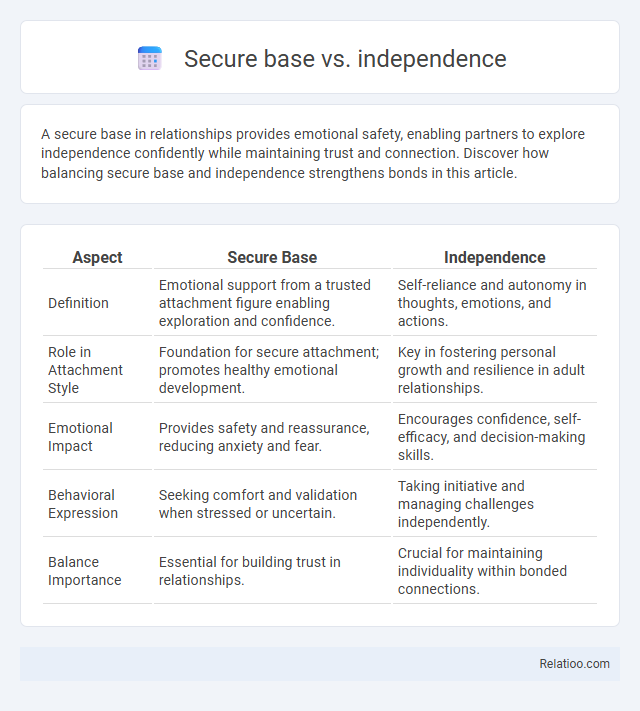A secure base in relationships provides emotional safety, enabling partners to explore independence confidently while maintaining trust and connection. Discover how balancing secure base and independence strengthens bonds in this article.
Table of Comparison
| Aspect | Secure Base | Independence |
|---|---|---|
| Definition | Emotional support from a trusted attachment figure enabling exploration and confidence. | Self-reliance and autonomy in thoughts, emotions, and actions. |
| Role in Attachment Style | Foundation for secure attachment; promotes healthy emotional development. | Key in fostering personal growth and resilience in adult relationships. |
| Emotional Impact | Provides safety and reassurance, reducing anxiety and fear. | Encourages confidence, self-efficacy, and decision-making skills. |
| Behavioral Expression | Seeking comfort and validation when stressed or uncertain. | Taking initiative and managing challenges independently. |
| Balance Importance | Essential for building trust in relationships. | Crucial for maintaining individuality within bonded connections. |
Understanding the Secure Base Concept
The Secure Base concept refers to the reliable presence of a caregiver or support figure that allows an individual to explore the world confidently, knowing they can return to safety if needed. Understanding this concept highlights the balance between providing emotional security and fostering independence, crucial for healthy development and resilience. Your relationships benefit from recognizing how a secure base supports autonomy while maintaining a foundation of trust and safety.
Defining Independence in Personal Development
Independence in personal development refers to the ability to make decisions, solve problems, and regulate emotions without relying on others, while maintaining a secure base that offers emotional safety and support. A secure base provides the foundational trust and confidence needed to explore new challenges, fostering autonomy without isolation. Balancing independence with a secure base ensures healthy growth, resilience, and effective self-regulation in personal development.
The Psychological Foundations of Security
The psychological foundations of security emphasize the balance between a secure base and independence, where a secure base provides emotional safety allowing You to explore and develop autonomy confidently. Security theory highlights that a supportive environment fosters resilience and psychological well-being by enabling individuals to return to a trusted figure for reassurance. This interplay between secure attachment and independence promotes optimal mental health and self-efficacy.
How Secure Bases Foster Exploration
Secure bases provide a reliable foundation of emotional support, enabling individuals to explore their environments with confidence and reduced anxiety. This supportive framework fosters autonomy by balancing independence with a safety net, encouraging risk-taking and learning within secure boundaries. Research in attachment theory highlights how secure base availability enhances cognitive and social exploration, leading to greater resilience and adaptive functioning.
Independence: Strengths and Limitations
Independence promotes self-reliance, critical thinking, and personal growth by encouraging individuals to make decisions and solve problems autonomously. However, excessive independence may lead to isolation, reduced collaboration, and difficulty seeking support during challenges. Balancing independence with a secure base ensures emotional safety while fostering resilience and confident decision-making.
Secure Attachment and Its Impact on Confidence
Secure attachment provides a reliable secure base that fosters your confidence by promoting emotional safety and trust. This secure foundation encourages independence, allowing you to explore and take risks while feeling supported. The balance between a secure base and independence cultivates resilience and self-assurance in personal development.
Balancing Dependence and Autonomy
Balancing dependence and autonomy is essential for fostering a secure base that supports your growth while encouraging independence. A secure base provides emotional support and safety, enabling you to explore and take risks confidently without losing connection. Maintaining this balance ensures healthy relationships where autonomy thrives alongside dependable support, promoting resilience and personal development.
Developmental Stages: From Secure Base to Independence
During early developmental stages, children rely heavily on a secure base, typically provided by caregivers, to explore their environment confidently and develop emotional resilience. As development progresses, this secure base fosters a gradual shift towards independence, enabling children to manage challenges while maintaining a foundation of trust and security. This transition from secure base to independence is crucial for healthy emotional and social growth, supporting autonomy without compromising the sense of safety essential for exploration and learning.
Parenting Strategies for Building Security and Independence
Secure base parenting strategies emphasize providing a reliable emotional foundation where children feel safe to explore their environment, nurturing trust and confidence. Independence-focused approaches prioritize encouraging self-reliance and decision-making skills, fostering autonomy while maintaining appropriate boundaries. Balancing secure base support with opportunities for independent growth creates resilient children capable of navigating challenges with confidence and emotional stability.
Achieving Emotional Balance: Integrating Secure Base and Independence
Achieving emotional balance involves integrating a secure base with independence, where your secure base provides a consistent source of emotional support and safety, enabling you to explore your autonomy confidently. This integration fosters resilience and self-regulation, allowing you to navigate challenges while maintaining emotional stability. Balancing attachment needs with personal freedom strengthens your overall well-being and promotes healthy relationships.

Infographic: Secure base vs Independence
 relatioo.com
relatioo.com